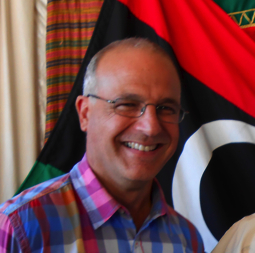British Ambassador Michael Aron writes on the fourth anniversary for the 17 February Revolution:

Today marks the anniversary of the momentous events . . .[restrict]of the 17 February Revolution, when the people of Libya took charge of their own future. On this day last year I joined the crowds in Tripoli to celebrate three years since the revolution. But so much has changed in just one year. After the elections of June 2014, sadly Libya has descended into months of political turmoil and uncertainty, and the worst violence since the battles of the Revolution. The day before yesterday, there was the news of the horrific murder of Egyptian Christians in Sirte, and subsequent air attacks on Derna.
As British Ambassador, I have seen for myself the great spirit of the Libyan people, and your pride in the principles of your revolution. The UK is proud of the support we gave to Libyans during 2011 and we continue to be resolute in our commitment to the democratic transition in Libya. So in the aftermath of recent events in Libya, it is more important than ever that we do not lose sight of the ideals and spirit of the 17 February Revolution, and that we stop and remember those Libyans who paid the ultimate sacrifice towards a democratic and peaceful Libya.
Libya was a country oppressed by four decades of bloody misrule, where people were not able to pursue their aspirations and have their voice heard. The Revolution was a demonstration of people’s ambitions to build a better Libya where rights and freedoms are protected by the state. Four years on, I believe that the hope and determination of the Libyan people to create a better future for their country remains. I saw this through the successful elections held in 2012 and 2014.
However, the deterioration in the security situation in Libya over the past year has been a major concern for the people of Libya, as well as for the wider international community. I am shocked about the situation in Libya today. A peaceful and democratic Libya cannot be achieved through continued violence. We all agree that further work needs to be done to realise the goals of the Revolution, but that work can only be done through inclusive dialogue – a process that brings together all political groups to agree on the future they want to see for their country. It is vitally important that all Libyans support and engage with the efforts of the UN and the Secretary General’s Special Representative Bernardino Leon to bring about a lasting political settlement that is underpinned by a new constitution that enshrines human rights for all Libyan citizens.
In parallel to this dialogue, it is absolutely critical that we all work together to tackle the threat of terrorism and extremism in Libya and the wider North Africa region. That work will take resolute patience and determination. But if we look at areas where this ideology is taking hold across the world, it is in areas where civilians do not have a voice, where they do not have a say in the democratic process of their country.
The UN political dialogue process is essential to achieve this.
The priority right now has to be political representatives in Libya coming together for talks to establish an immediate ceasefire and agree on a national unity government. This is the next step on the road to realising the hope of the Revolution.
The UK remains firmly committed to helping the Libyan people achieve a peaceful way forward, and will continue to offer support. [/restrict]







